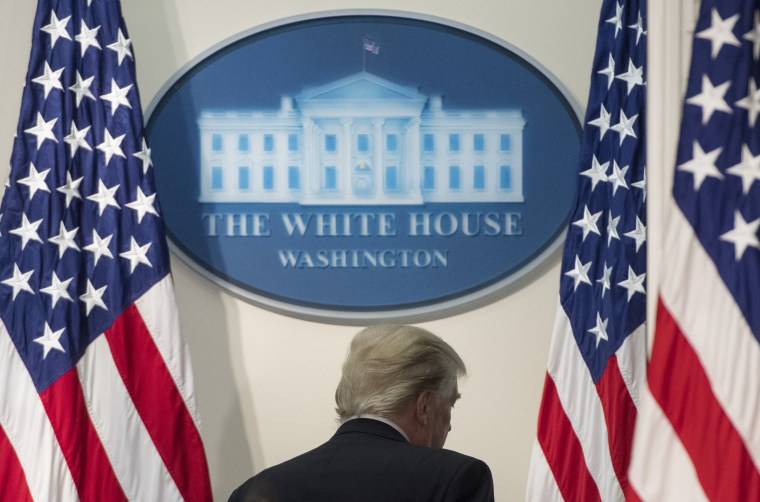As part of a lengthy series of online missives about sports and politics over the weekend, Donald Trump positioned himself as some kind of arbiter of patriotism. This was the message last night, for example:
"Sports fans should never condone players that do not stand proud for their National Anthem or their Country. NFL should change policy!"
Three hours earlier, the president published a related message:
"Courageous Patriots have fought and died for our great American Flag --- we MUST honor and respect it! MAKE AMERICA GREAT AGAIN!"
There were a variety of similar tweets pushing the same theme: Trump, we're supposed to believe, is truly patriotic, while some of those engaged in peaceful protests on civil rights are showing disrespect toward the United States.
For a politician who's demonstrated authoritarian instincts on a few too many occasions, Trump's nationalistic posturing is unsettling. But just as important is the fact that the president doesn't seem to appreciate just how poor a messenger he is for this particular message.
Two weeks after taking office, for example, Trump sat down for an interview in which he was reminded that Russian President Vladimir Putin is "a killer." Trump replied, "There are a lot of killers. We've got a lot of killers. What, do you think our country's so innocent?"
As we discussed at the time, Americans generally aren't accustomed to hearing their president be quite this critical of the United States -- out loud and in public. What's more, the idea that the U.S. chief executive sees a moral equivalence between us and an autocratic thug came as a reminder that Donald Trump doesn't always hold his country in the highest regard.
Indeed, as regular readers may recall, the Republican hasn't exactly been subtle on this point. In December 2015, for example, then-candidate Trump was asked about Putin's habit of invading countries and killing critics. "He's running his country, and at least he's a leader," Trump replied, "unlike what we have in this country." Reminded that Putin has been accused of ordering the murder of critics and journalists, Trump added, "Well, I think our country does plenty of killing also."
In a July interview with the New York Times, the Republican went on to argue that the United States lacks the moral authority to lead, because we're just not a good enough country to command respect abroad. "When the world looks at how bad the United States is, and then we go and talk about civil liberties, I don't think we're a very good messenger," he said.
There's never been a president, from either party, who's been so cavalier about America lacking in credibility. Sentiments such as "When the world looks at how bad the United States is..." are usually heard from America's opponents, not America's president. The Atlantic's Jeffrey Goldberg noted during the campaign that Barack Obama "has never spoken as negatively about America as Donald Trump has."
Perhaps the president and his allies can consider a thought experiment. If they heard Colin Kaepernick defend a foreign autocrat by saying the United States isn't "innocent," chiding the United States for doing "plenty of killing," complaining about "how bad the United States is," and insisting Americans don't have the credibility to lead internationally on civil liberties, I suspect they'd say the quarterback was running down the country in an insulting way.
But Colin Kaepernick didn't say any of these things; Donald Trump did.
It's the president who explicitly rejected the idea of "America exceptionalism," questioning aloud whether the United States really is "more outstanding" than other nations. It's the president who's mocked American prisoners of war, derided a Gold Star family, and insulted service members with PTSD.
Just to be clear, Trump is free to criticize the United States as much as he pleases. Freedom of speech and political expression protects the president as much as it protects dissenting athletes. Even if I don't like what Trump has to say about our country's lack of moral standing, I recognize his right to say it.
But those looking for lessons on the virtues of patriotism should probably look elsewhere.
